- Home
- Kristin Harmel
The Forest of Vanishing Stars Page 6
The Forest of Vanishing Stars Read online
Page 6
As she moved from hollowed tree to hollowed tree, finding a different place to sleep each night, she could hear the buzz of aircraft overhead sometimes, and the movement of men through the trees in the distance. Germans ventured into the forest’s edges on occasion, searching for Jews, but so far, the heart of the forest had remained safe. But would the Germans invade with their army at some point? Would they mow the trees down, take away the only shelter she had ever known? It sounded crazy, but so, too, did the systematic murder of innocent people Isaac had told her about. Perhaps the whole world had gone mad.
She had walked many kilometers in order to put as much distance as she could between herself and the way she had failed Chana’s family, and by July, she was in the southern part of the forest. One cloudy morning, she had just begun to move again for the day when she spotted a man up ahead, standing by a stream, his back to her. Quickly, she ducked behind a tree and held herself motionless, watching him.
His clothes were threadbare, a stained and torn shirt stretched over his broad back and rolled at the sleeves, his pants pushed up to his calves. He was older than Yona, she thought, but not by much. His hair was the color of river silt, and it glimmered in the sifted sunlight filtering through the trees.
He was standing completely still as he stared at the water, and Yona held her breath, studying him. He looked strong, but his waist was too narrow for his body, someone who was accustomed to plentiful food but had recently learned to live without, she guessed. But what was he doing? Studying his own reflection in the placid stream?
Her question was answered a second later when, with a grunt, he dove headfirst into the water, splashed around for a second, and then groaned. “It got away!” he called out in Yiddish, shaking the droplets from his hair as he climbed out of the water. Yona shrank farther into the trees, motionless. Judging from his language, he was Jewish, too, like Chana’s family.
“I told you,” came another masculine voice, this one farther away. Yona held her breath. There were two of them? “You can’t catch a fish with your bare hands.”
There was the sound of footsteps breaking branches, and then the second man emerged in the clearing, across the stream from the first. He looked younger, slimmer, the lines of his face more sharply drawn, his hair as black as Yona’s.
“I suppose you have a better idea?” asked the first man, again staring at the water.
“Berries?” the other man asked with a shrug. “Mushrooms?”
“We can’t feed everyone berries for the rest of their lives, and you and I can’t tell the poisonous mushrooms from the harmless ones,” the first man said. “Give me a minute, Leib. I’ll catch us something.”
“Sure, or you’ll make such a racket that you’ll attract every disgruntled Soviet partisan in the forest.”
“There’s nobody out here,” the first man grumbled. But Yona could hear the smile in his voice.
The one called Leib stood and watched, an eyebrow cocked, as the broader-shouldered man went still and silent once more. Again he pounced on something in the water, and just like the last time, he came up empty-handed, muttering to himself.
“We need a better solution, Aleksander,” Leib said, and this time, the teasing tone was gone. “They’re starving.”
As the one called Aleksander stepped once more from the shallow stream, shaking the water off, Yona could see, even from a distance, that his expression had sobered. She didn’t believe the smile he forced as he turned back to Leib. “I’ll take care of it, Leib. All will be well.”
Yona watched in silence as Leib walked away, shoulders slumped. As she turned her gaze back to Aleksander, she was surprised to hear him begin to pray softly, asking first if God was there and then telling the sky that he would give anything for a little luck, a little food. “They’re counting on me,” he concluded, his voice mournful as he looked to the water once more.
Yona wanted nothing more in that moment than to step from the trees and be the answer to his prayer, the proof that after whatever terrible things he had endured to bring him here, there was a God after all. But who was she to think she could save anyone from the darkness? She had failed with Chana’s family. She’d likely been wrong to try to help them in the first place; hadn’t Jerusza always taught her that she was better off alone? Then again, how could she ignore the pull of her heart, the part of her that couldn’t turn away from a person in need? What if Jerusza’s path hadn’t been the right one? Who was the old woman to still be pulling the strings of Yona’s life?
The man called Aleksander dove thrice more into the water, trying to catch fish with his bare hands, before finally sitting down hard on the streambank with a heavy sigh. His back was to Yona, and she could see the tension knotting it through his wet shirt. Water dripped from his hair onto his collar, and as he reached up to scratch his head, he let out an almost inhuman moan of despair. “My God, what will I do?”
“I—I can help.” Yona heard her own voice before she had actually formed the intent to reveal herself. She spoke in Yiddish, because it was the language the man had been speaking moments before. The man scrambled to his feet at once and turned, searching the forest for the source of the sound before his gaze settled on her.
He blinked a few times, confusion washing over his features, as she forced herself to step from the trees. There was no turning back now. They regarded each other for a few long seconds. She could feel her heart thudding against her rib cage.
“Amkha?” he asked after a moment, his expression wary, uncertain.
It was a Hebrew word, one that roughly meant “the nation of people.” He was asking if she was one of them, a fellow Jew, but the question was the one that had been tormenting her, the one she couldn’t answer, so she merely shrugged.
“Where did you come from?” he asked at last.
She hesitated. This was a mistake. His friend would return at any moment, and then what? But in an instant, she saw Chana’s face in her mind’s eye and she felt the weight of her failure. She couldn’t turn away, not again. “I come from the forest,” she said simply.
A small smile pulled at the left corner of his lips. “I see that. I meant to ask where you came from before that.”
“The forest,” she repeated, and she watched as his brow creased.
“The forest.” He scratched his head. “But you speak Yiddish.” She could see him trying to puzzle her out.
“You do, too,” she replied, but offered no explanation. “You need help.”
“I—” He started and stopped. “I have people to feed. People who are relying on me. I—I was only a bookkeeper before this. If you need me to run some numbers for you, no problem, but surviving in the woods…” He forced a smile, seemingly trying to make the moment feel lighter, but his eyes gave him away, and finally, his gaze fell. “You see, they need me, and I don’t know what to do.”
She nodded. They stared at each other for a long time, and then Yona took a deep breath and started forward, her blood pulsing hot through her veins. “You are trying to grab the pike because they are larger, but that’s difficult using only your hands. There are dace in the water, too, very small fish, plenty of them, much easier to catch. You just need to know how.”
He studied her as she came closer, so close that she could feel the way his presence rippled the air between them. The current made her want to run away, but it also made her want to draw closer. Paralyzed, she stood frozen in place. “Who are you?” he asked softly, looking down at her.
It was a simple question, but it stilled her for a moment. How could she reply when she didn’t know the answer herself? So she let her eyes slide away. “I am the person who will help you feed your people tonight. All right?”
He stared at her for a minute more before chuckling to himself, though not unkindly. He took a step back. “All right.”
They locked eyes for a few long seconds; then she turned away and, with her back to him, quickly removed her boots, rolled her trouser legs a few times, a
nd stripped off her shirt, leaving only a thin undershirt beneath. She could hear the intake of his breath as she turned back around and stepped into the stream. The water was cold, bracing, as it burbled around her ankles. She lowered her shirt into the water, making an opaque net of it. She waded deeper, not minding that she was getting her clothes wet. The sun was hot and would easily dry them, and they were in need of a wash anyhow. She stood still, hardly breathing, until the fish forgot she was there, wiggling all around her, their silver scales glimmering in the sun, catching the light. And then, so quickly that if the man had blinked, he would have missed it, she scooped her shirt up in one quick motion, curving it into a half-sphere so that nothing could escape over the sides as the water drained. Within the fabric, seven small fish gasped and flailed. She held them up to him and smiled. “See?”
His mouth hung slightly open as he looked from Yona to the bundle of fish and back. “How did you…?”
“You have to become a part of the water.”
He blinked a few times and then waded into the water beside her. He pulled off his shirt, revealing taut skin browned by the sun, stretched over sinewy muscles. She was suddenly very conscious of him as the ripples from his movement lapped against her legs. He stayed still for a few seconds, trailing his shirt in the water, but it wasn’t long enough, and when he yanked the makeshift net out, the fish scattered, and he came up empty. “You made it look easy,” he said, looking up at Yona with chagrin.
“I have been doing this nearly all my life.” She realized only as the words left her mouth that she had just confided something to him, told him something about herself. She hadn’t intended to. “You will learn.” She felt exposed under his gaze, but she was surprised to realize that it didn’t bother her, not like she’d thought it would. He was looking right at her, and there was something about being seen that reminded her that she wasn’t just a ghost, a spirit in the woods. “How many do you need to feed?” she asked him.
He hesitated, and she could see him weighing his options, deciding whether he should be honest. That was good; he was cautious. He was right not to immediately trust a stranger, and she respected him for it. “Thirteen, including myself,” he said after a long pause. “Fourteen if you count the baby.”
Thirteen people and a baby, hidden somewhere nearby. It was almost incomprehensible. “You are many.”
He nodded, watching her closely.
“You have come from the ghetto in Volozhin?”
“Volozhin?” He was still trying to puzzle her out, but after a second, he shook his head. “No. We are from the ghetto in Mir, to the south of the forest.”
She closed her eyes for a few seconds. “And you escaped?”
“Yes, but to what?” he asked softly. “It is summer now, with enough plants to eat, but what happens when the winter comes? How will I feed them all? I convinced them to leave with me. I promised that I could take care of them. But what if I cannot? What if we were better off where we were?”
“You were not.” The immediacy of her response startled both of them. “The forest will care for you better than the ghetto would. And you will learn.”
Again he seemed to be trying to read her eyes. “You know the ghetto, then? In Volozhin? That’s where you’ve come from?”
“No.” She knew he was fishing for more, but she wasn’t ready to be caught. “We will catch enough dace to feed your people tonight. Tomorrow, you will come back, and I will show you how to make a kryha.”
“A kryha?”
“I don’t know another word for it. It’s—it’s a net. You will catch a lot of fish that way. More than enough, and some pike, too, the larger ones.”
“I don’t know what to say.”
Neither did Yona, so she slid the seven fish from her shirt and held them out to the man, who hesitated for a few seconds before holding his dripping shirt up like a basket. Yona slipped the fish into the fabric. She tried not to notice how his muscled chest and shoulders gleamed with perspiration. His body was different from that of Chana’s father, and it elicited in her a reaction that she didn’t quite understand.
In short measure, she collected another six fish and handed them over silently, her eyes sliding away as he watched with his mouth agape. Twice more, she gathered a half dozen, until she had handed him a total of twenty-five. They were small, but they would be enough until tomorrow. “You can pick some sulfur-shelf mushrooms, too,” she said as he bundled the fish into his shirt, making a sack of it. She emerged from the water and strode to a nearby tree trunk, where dozens of flat, deep-yellow mushrooms grew right out of the bark, one on top of the other. “You will see these all over the forest this time of year. They are safe if you cook them and will taste good in a stew with the fish. Just take care if any in your group are feeling ill; mushrooms are hearty and will help you to survive, but they are sometimes difficult to digest.” She promptly closed her mouth. Had she said too much? She busied herself with tearing two handfuls of mushrooms from the tree and crossing over to him, hands outstretched.
“I don’t know how to thank you,” he said, taking the mushrooms and examining them almost reverentially before looking back at her. When she finally met his gaze, she could see awe in his eyes, and it both unsettled and pleased her that she was capable of evoking such a thing. “I’m Aleksander,” he added.
“I know.” When he looked at her with confusion, she added, “I heard your friend say it.”
“Ah, Leib.”
“Don’t tell him about me. Please.” She spoke before she could think. She knew it must have seemed a strange request, but she already felt exposed. If Aleksander could keep his word, could keep her a secret a little longer, maybe she could summon the courage to introduce herself to his friend, too. But not now, not yet. This was already too much.
“I give you my word. Though he will be very confused to see me bring back so many fish, considering how unskilled I’ve already proven myself to be.” Aleksander smiled.
She returned the smile shyly.
“You haven’t told me your name,” he said after a few seconds had passed.
She took a deep breath. “It’s Yona.”
He blinked a few times. “You have a Hebrew name.”
“Yes.”
“It’s beautiful,” Aleksander said, and she could feel herself blushing again. “Thank you, Yona. For everything. I will return tomorrow.”
And then he was gone, and she found herself wondering if she should have said more, should have made sure he knew how to clean and prepare the fish. But it was too late—for both that and turning back time. Even if Aleksander and his people moved on after a few days, even if she never saw him again, she had crossed a line into a new life, one in which seeing Chana’s lifeless body—and hearing of the horrors of the ghetto—had changed her forever.
“I’m sorry, Jerusza,” she whispered into the wind, but there was no reply, not even a rustling of the trees. Still, it mattered little. No longer was the forest a sanctuary where she could live out the rest of her days alone, preserving only her own life. She had to do something to help the people like Aleksander, who were just trying to survive.
CHAPTER SEVEN
Yona hardly slept that night, and she rose before the sun. After praying for guidance, and once again speaking to Jerusza without hearing an answer, she set out toward the stream in the graying darkness, intending to get to work making rope for the kryha.
But as she approached the streambed, her skin tingled, and her hair stood on end. Someone was already there, waiting in the darkness. She could feel an ash-scented presence, something that didn’t belong. She tensed and ducked behind a tree, holding her breath as she listened, ready to run.
At first there was nothing, no movement. After a moment, though, a stick snapped, and she could hear footsteps. Silently, she pulled her knife from its ankle holster. And then, a voice cut through the darkness.
“Yona? Is that you?”
It was deep, uncertain, and she recognize
d it immediately. She took a deep breath and stepped out from behind the tree, still clutching her knife. “Aleksander.”
In the east, above the thick canopy of trees, the sky was beginning to pale as the earth spun slowly toward dawn. It was light enough now that she could see him standing by the water, looking for her. When his eyes met hers, he cracked a small smile, but she didn’t put her knife away yet.
“Why are you here?” She took a step forward and then another. “I thought you were with your people.”
“I was.” He took a step toward her, but he stopped abruptly when she took an instinctive step back. He held up his hands. “I’m sorry. I didn’t mean to startle you. I was just eager to get started this morning.”
She studied him for a moment and then relaxed. What was wrong with her, feeling suspicious of a man who was merely eager to find food? Jerusza’s words of warning rang in her ear—Men can be cruel and heartless and cold—but she pushed them away. The old woman was wrong. Humans had a responsibility to do more than just protect themselves. In the face of evil, they were compelled to save each other. It was the only way mankind could survive. “Were the fish enough to feed everyone last night?” she asked as she slipped her knife back into its spot at her ankle.
“You would have thought we were having the feast of our lives.” He smiled. “They were very grateful, Yona. It felt wrong to accept their praise myself. I wanted to tell them about you.”
She nodded. There would come a time when he would have to. If she was truly going to help, she would need to go to them, teach them how to survive. But not yet. “What do you have there?” she asked, forcing herself to take another step closer.
He held up a small bundle a bit sheepishly. “Rope. You mentioned making a net. I thought this might help.”
Yona stared. “Rope?” She had planned to show him how to weave rope from nettles, which were plentiful in the forest. It would have taken the whole day, but it would be a lesson that would serve him well in the future. “Where did you get rope?”

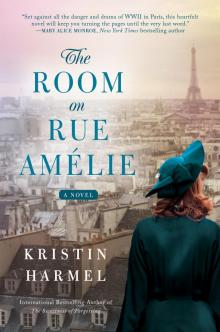 The Room on Rue Amélie
The Room on Rue Amélie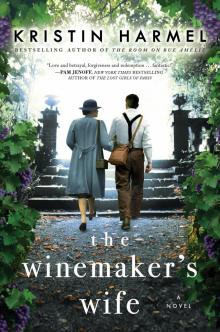 The Winemaker's Wife
The Winemaker's Wife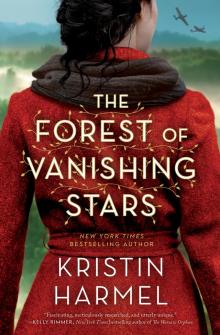 The Forest of Vanishing Stars
The Forest of Vanishing Stars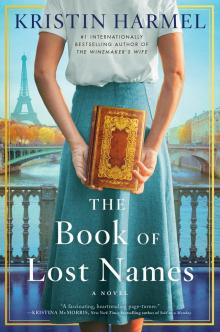 The Book of Lost Names
The Book of Lost Names Italian for Beginners
Italian for Beginners After
After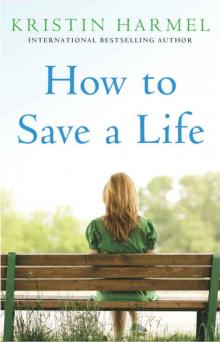 How to Save a Life
How to Save a Life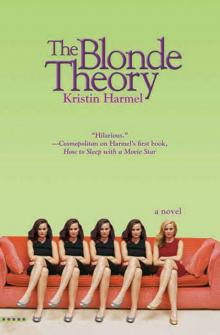 The Blonde Theory
The Blonde Theory The Sweetness of Forgetting
The Sweetness of Forgetting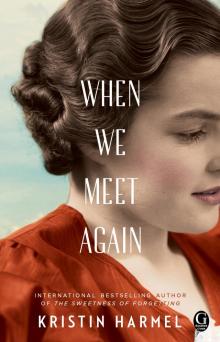 When We Meet Again
When We Meet Again Life Intended (9781476754178)
Life Intended (9781476754178)